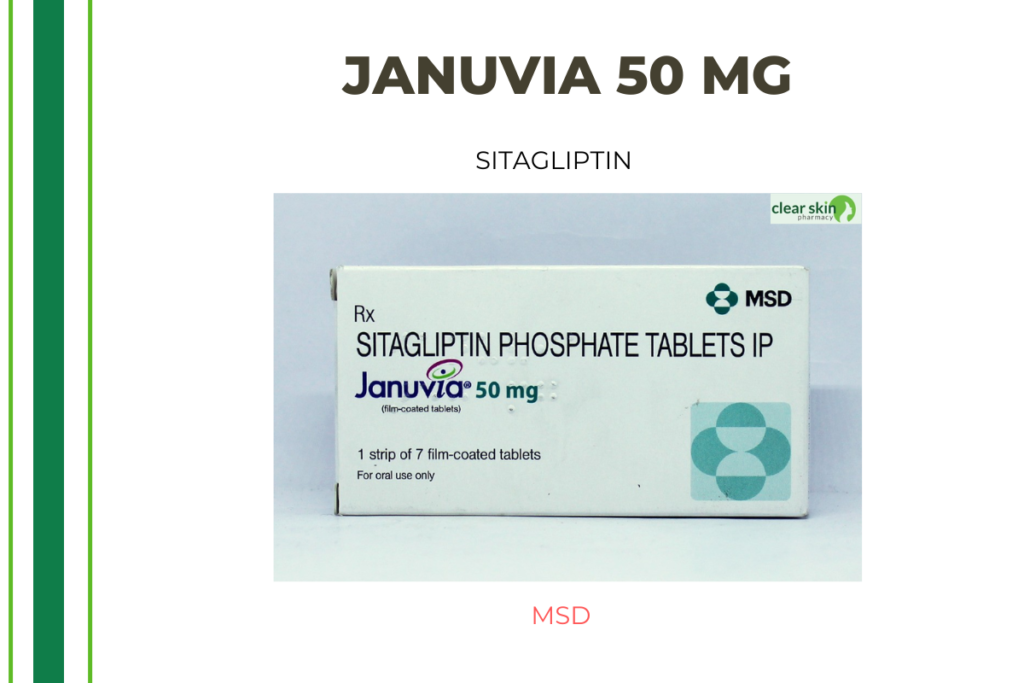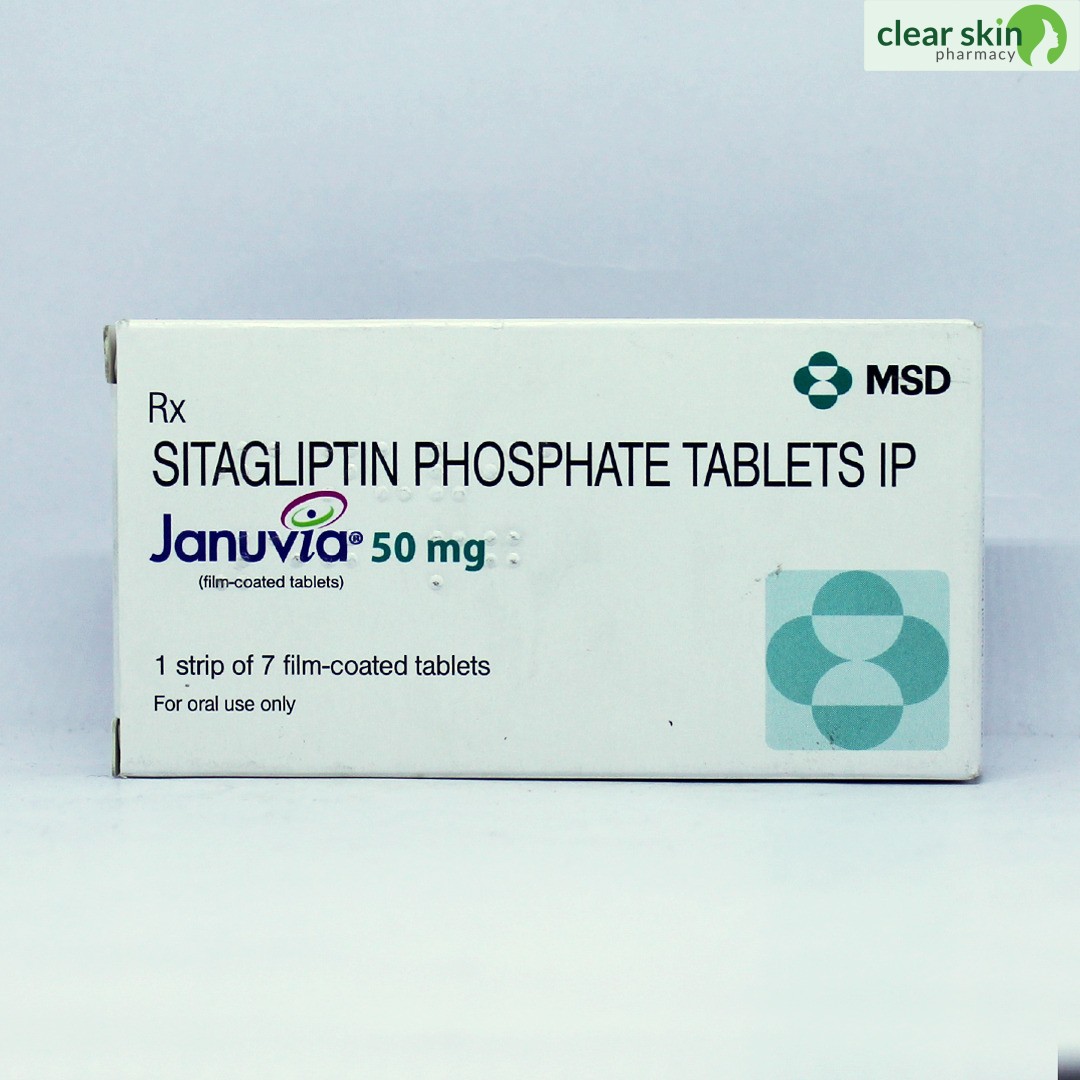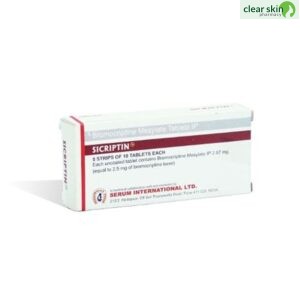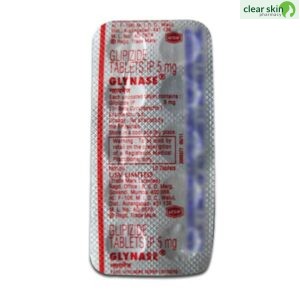Januvia 50 mg
Januvia 50 mg contains Sitagliptin, an inhibitor of dipeptidyl peptidase-4 (DPP-4) used to treat type 2 diabetes in adults. Januvia 50 mg is prescribed to people with type 2 diabetes who cannot control their blood sugar levels via diet and exercise alone. It is the first-line treatment for patients with type 2 diabetes, restoring the body’s insulin sensitivity. Insulin is the hormone responsible for regulating blood glucose levels. Individuals with type 2 diabetes either produce insufficient insulin or the insulin they do produce is ineffective (insulin resistance). Type 2 diabetes is typically diagnosed in middle-aged or older adults, hence its other name, adult-onset diabetes.
Januvia 50 mg is contraindicated for the treatment of type 1 diabetes and diabetic ketoacidosis. Januvia 50 mg inhibits DPP-4 (an enzyme that breaks down the hormone Incretin). The enzyme ‘Incretins’ aids the body in creating extra insulin when it is needed and in reducing blood sugar levels produced by the liver when it is not.
The 50 mg dose of Januvia should be taken on an empty stomach or with food. For maximum results, the medication should be taken at the same time each day. Your physician will decide the proper dose, which may change frequently depending on your condition. The most often reported side effects of Januvia 50 mg include hypoglycemia (low blood glucose levels), upper respiratory tract infection, nasopharyngitis (nose and throat infection caused by the common cold), and headache.
Even if you feel better, you should not discontinue Januvia 50 mg without consulting your doctor, as your blood sugar level will continue to vary. Your risk of vision loss (retinopathy), kidney damage (nephropathy), and nerve damage may increase if you abruptly stop taking Januvia 50 mg (neuropathy). If you have severe kidney or liver disease, you should not take 50 mg of Januvia. Inform your doctor if you have a heart problem, if you are pregnant or intend to become pregnant, or if you are breastfeeding.
Long-term use of Januvia 50 mg may result in severe pancreatitis (swelling of the pancreas) and major kidney issues. When Januvia 50 mg is combined with other anti-diabetic drugs or insulin therapy, the risk of hypoglycemia (low blood sugar) may increase. In this situation, your doctor may adjust the dosage of Januvia 50 mg. Certain patients taking Januvia 50 mg may suffer severe allergic reactions such as anaphylaxis, angioedema (swelling beneath the skin), and exfoliative skin illnesses such as Stevens-Johnson syndrome. The safety and efficacy of Januvia 50 mg in children younger than 18 years of age have not been established; therefore, it should not be administered to them. A significant drug interaction has been recorded between digoxin (a heart medicine) and Januvia 50 mg. Patients taking both medications should be monitored closely.
Januvia 50 mg Therapeutic Uses Type 2 diabetes mellitus

Medicinal Advantages
Januvia 50 mg inhibits DPP-4 (an enzyme that breaks down the hormone Incretin). The enzyme ‘Incretins’ aids the body in creating extra insulin when it is needed and in reducing blood sugar levels produced by the liver when it is not. Thus, Januvia 50 mg is essential for blood sugar control and the avoidance of serious diabetes-related complications, including vision loss (retinopathy), kidney damage (nephropathy), nerve damage (neuropathy), diabetic foot ulcers, and delayed wound healing.
Use Instructions
Januvia 50 mg is indicated for daily use. It can be consumed with or without meals. Patients with moderate to severe kidney disease or end-stage kidney disease may require a dosage change.
Storage Avoid direct sunlight and store in a cool, dry spot.
Januvia 50 mg Adverse Effects
Each drug has its own list of side effects. During the first few days of treatment with Januvia 50 mg, you may have hypoglycemia, upper respiratory tract infection, nasopharyngitis (cold-related nose and throat infection), or headache. However, they would be temporary and may be alleviated after a while. Consult a physician if you continue to suffer trouble.
Adverse Drug Reactions
Long-term usage of sitagliptin may result in acute pancreatitis (swelling of the pancreas) and severe renal issues. When used with other anti-diabetic drugs or insulin therapy, sitagliptin may raise the risk of hypoglycemia (low blood sugar level). In this case, your doctor may adjust your Sitagliptin dosage. Certain individuals taking Sitagliptin may suffer severe allergic reactions such as anaphylaxis, angioedema (swelling beneath the skin), and exfoliative skin illnesses such as Stevens-Johnson syndrome. The safety and efficacy of sitagliptin in children under the age of 18 have not been established; therefore, it should not be administered to them. A significant drug interaction has been observed between digoxin (a prescription for the heart) and Sitagliptin, thus patients taking both should be monitored closely.
Interactions Between Drugs
Antidepressants (bupropion), glaucoma medications, antibiotics (cephalexin, ciprofloxacin), anti-acidity medications (cimetidine), anti-HIV medications (dolutegravir), ethanol, saliva reducing medications (glycopyrrolate), iodinated X-ray contrast agents, anti-epileptic medications (topiramate, lamotrigine), and heart-related medications interact with sitagliptin (ranolazine). Other medications, such as sex hormones (androgens), antioxidants (alpha-lipoic acid), pain relievers (aspirin), anti-tuberculosis treatments (prothionamide), growth hormones (pegvisomant), and other antidiabetic therapies, may also raise the risk of low blood sugar.
Drug-Food Interaction: Excessive alcohol use may increase the chance of acquiring Lactic Acidosis, a potentially lethal disease. Therefore, avoid consuming alcoholic beverages while using Sitagliptin.
Sitagliptin should be administered with caution to patients with a history of pancreatitis/pancreatic disease and renal impairment.
Safety Recommendations
ALCOHOL
Yes, alcoholic beverages can be consumed while taking Sitagliptin. Nevertheless, exceeding 175ml may increase your risk of hypoglycemia.
PREGNANCY
Sitagliptin is recognized as a pregnancy category B drug. This suggests that there is insufficient scientific proof for Sitagliptin; hence, it is best to consult a doctor.
BREAST FEEDING
Since there is little scientific proof for Sitagliptin, it is recommended that you consult a doctor.
DRIVING
Sitagliptin has no influence on the ability to operate a motor vehicle or heavy machinery. However, there have been reports of dizziness and fatigue, which could affect your ability to drive or operate machines.
LIVER
Patients receiving Sitagliptin for an extended period of time have had rare instances of liver enzyme elevations. Therefore, if you have a history or symptoms of any liver-related condition, you should consult a doctor prior to using the medicine.
KIDNEY
Acute renal failure has been reported in patients treated with Sitagliptin. In extreme circumstances, dialysis may be necessary. Patients with mild, moderate, or severe kidney disease, as well as inpatients with renal failure, may require dosage adjustments (also known as ESRD – end stage renal dialysis).
No Habit Formation
Advice on Diet and Lifestyle
Spend at least 150 minutes per week in physical exercise of moderate intensity or 1 hour and 15 minutes per week in physical activity of vigorous intensity.
Gradual weight loss to achieve a healthy body mass index (18.5 to 24.9).
Replacing refined carbohydrate foods with whole grain foods and boosting consumption of fruits, vegetables, and other fiber-rich foods.
Reduce your consumption of items containing saturated fat (or hidden fat), such as chips, crisps, pastries, cookies, and samosas. Choose omega 3 fatty acid-rich oils for everyday cooking. For frying, utilize palm oil, mustard oil, groundnut oil, rice bran oil, or safflower oil.
Avoid excessive stress, as it may lead to an increase in blood sugar. You can acquire stress management techniques such as mindfulness, meditation, and yoga to manage stress-induced blood sugar fluctuations.
Prioritize the acquisition of low-fat dairy products (low-fat yoghurt, fat-free milk and cheese etc.).
Maintain a blood pressure as close to normal as feasible (140/90), as this reduces the risk of cardiovascular disease in diabetics.
Additionally, this item is non-returnable.
Concern for Patients
Type 2 diabetes is a condition in which the body cannot create enough insulin or the insulin it does produce does not work appropriately or is not utilized properly by the body. This can lead to high blood glucose levels (hyperglycemia). Type 2 diabetes is characterized by an increase in thirst, nighttime urination, poor wound healing, an increase in appetite, fatigue, and blurred vision. In rare instances, weight loss may occur, although weight gain is possible under specific conditions. Neuropathy (nerve damage), nephropathy (kidney damage), retinopathy (damaged retina of the eyes or blindness), amputation of limbs, sexual dysfunction, and an increased risk of heart attack or stroke are consequences of type 2 diabetes.








Be the first to review “JANUVIA 50 MG 7 Tablets”